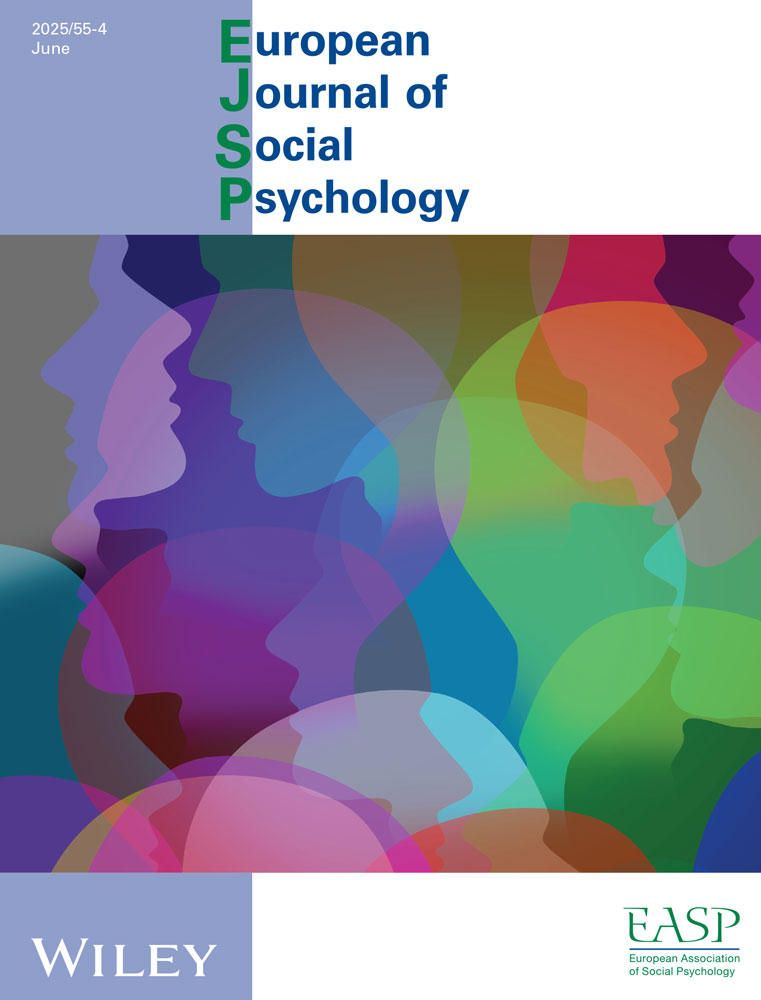Are you what you feel? The affective and cognitive determinants of self-judgments
Corresponding Author
Robert S. Wyer Jr.
University of Illinois, at Urbana-Champaign
Department of Psychology, 603 E. Daniel Street, Champaign, IL 61820, U.S.A.Search for more papers by this authorCorresponding Author
Robert S. Wyer Jr.
University of Illinois, at Urbana-Champaign
Department of Psychology, 603 E. Daniel Street, Champaign, IL 61820, U.S.A.Search for more papers by this authorAbstract
Subjects recalled an affect-eliciting event that had occurred to them in either an achievement situation or an interpersonal situation. Recalling a positive or negative achievement experience (for which Subjects appeared to take personal responsibility) influenced judgments of their competence in achievement situations. Whereas thinking about a positive or negative interpersonal experience (for which subjects appeared to deny responsibility) did not influence judgments of their competence in social situations. On the other hand, both types of affect-eliciting experiences influenced subjects' judgments of their competence in the domain to which these experiences had no direct implications, and also judgments of their general self-esteem. Implications of these results for a more general conceptualization of self-esteem and its stability are discussed.
References
- Andersen, S. M. (1984). ‘Self-knowledge and social inference: II. The diagnosticity of cognitive/affective and behavioral data’, Journal of Personality and Social Psychology, 46: 294–307.
- Andersen, S. M. (1985). ‘Cognitive/affective reactions in the improvement of self-esteem: When thoughts and feelings make a difference’, Journal of Personality and Social Psychology, 49: 1086–1097
- Andersen, S. M. and Ross, L. (1984). ‘Self-knowledge and social inference: I. The impact of cognitive/affective and behavioral data,’ Journal of Personality and Social Psychology, 46: 280–293.
- Blaney, P. H. (1986). ‘Affect and memory: A review’, Psychological Bulletin, 99: 229–246.
- Block, J. (1971). Lives Through Time, Bancroft Books, Berkeley, Calif.
- Bower, G. H. (1981). ‘Mood and memory’, American Psychologist, 36: 129–148.
- Clark, M. S. and Isen, A. M. (1982). ‘ Toward understanding the relationship between feeling states and social behavior’. In: A. Hastorf and A. Isen (Eds). Cognitive Social Psychology, Elsevier, New York, pp. 73–108.
- Clore, G. L., Schwarz, N. and Conway, M. (in press). ‘ Affective causes and consequences in social information processing’. In: R. S. Wyer and T. K. Srull (Eds). Handbook of Social Cognition, 2nd edn, Erlbaum, Hillsdale, NJ.
- Coopersmth, S. (1967). The Antecedents of Self-Esteem, W. H. Freeman, San Francisco.
- Costa, P. T., McCrae, R. R. and Arenberg, D. (1980). ‘Enduring dispositions in adult males’, Journal of Personality and Social Psychology, 38: 793–800.
- Epstein, S. (1979). ‘The stability of behavior I: On predicting most of the people much of the time’, Journal of Personality and Social Psychology, 37: 1097–1126.
- Forgas, J. P. (1992). ‘ Affect in social Judgments and decisions: A multi-process model’ In: M. Zanna (Ed.) Advances in Experimental Social Psychology, Academic Press, New York.
- Griffitt, W. and Veitch, R. (1971). ‘Hot and crowded: Influences of population density and temperature on interpersonal affective behavior’, Journal of Personality and Social Psychology, 17: 92–98.
- Isen, A. M. (1984). ‘ Toward understanding the role of affect in cognition’ In: R. S. Wyer and T. K. Srull (Eds). Handbook of Social Cognition, Vol. 3, Erlbaum. Hillsdale, NJ, pp. 179–236.
- Johnson, E. J. and Tversky, A. (1983). ‘Affect, generalization, and the perception of risk’, Journal of Personality and Social Psychology, 45: 20–31.
- Martin, L. L., Ward, D. W., Achee, J. W. and Wyer, R. S. (1993). ‘Mood as input: People have to interpret the motivational implications of their moods’, Journal of Personality and Social Psychology, 64: 311–326.
- Parrott, W. G. and Sabini, J. (1990). ‘Mood and memory under natural conditions: Evidence for mood incongruent recall’, Journal of Personality and Social Psychology, 59: 321–336.
-
Rosenberg, M.
(1965).
Society and the Adolescent Self-Image,
University Press, Princeton.
10.1111/j.1559-1816.2002.tb02765.x Google Scholar
- Rosenberg, M. (1979). Conceiving the Self, Basic Books, New York.
- Schwarz, N. (1990). ‘ Feelings as information: Informational and motivational functions of affective states’. In: E. T. Higgins and R. M. Sorrentino (Eds). Handbook of Motivation and Cognition, Vol. 2, Guilford Press, New York, pp. 527–561.
- Schwarz, N. and Clore, G. L. (1983). ‘Mood, misattribution, and judgments of well-being: Informative and directive functions of affective states’, Journal of Personality and Social Psychology, 45: 513–523.
- Schwarz, N., Strack, F., Kommer, D. and Wagner, D. (1987). ‘Soccer, rooms and the quality of your life: Mood effects on judgments of satisfaction with life in general and with specific life domains’, European Journal of Social Psychology, 17: 69–79
- Sherman, S. J. and Corty, E. (1984). ‘ Cognitive heuristics’ In: R. S. Wyer and T. K. Srull (Eds). Handbook of Social Cognition, Vol. 1, Erlbaum, Hillsdale, NJ, pp. 189–286.
- Strack, F., Martin, L. L. and Stepper, S. (1988). ‘Inhibiting and facilitating conditions of the human smile: A non-obtrusive test of the facial feedback hypothesis’, Journal of Personality and Social Psychology, 54: 768–777
- Strack, F., Schwarz, N. and Gschneidinger, E. (1985). ‘Happiness and reminiscing: The role of time perspective, affect and mode of thinking’, Journal of Personality and Social Psychology, 49: 1460–1469
- Taylor, S. E. and Fiske, S. T. (1978). ‘ Salience, attention and attribution: Top of the head phenomena’ In: L. Berkowitz (Ed.) Advances in Experimental Social Psychology, Vol. 11, Academic Press, New York, pp. 249–288.
- White, G. L., Fishbein, S. and Rutstein, J. (1981). ‘Passionate love and the misattribution of arousal’, Journal of Personality and Social Psychology, 41: 56–62.
- Wright, J. and Mischel, W. (1982). ‘The influence of affect on cognitive social learning person variables’, Journal of Personality and Social Psychology, 43: 901–914.
- Wyer, R. S. and Srull, T. K. (1986). ‘Human cognition in its social context’, Psychological Review, 93: 322–359
- Wyer, R. S. and Srull, T. K. (1989). Memory and Cognition and its Social Context, Erlbaum, Hillsdale, NJ.




